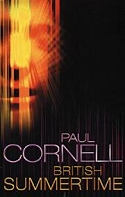

Sometimes when I pick up a novel I yearn for something that will mark it as special. It needn't be a book which creates a new sub genre of science fiction, no. What I look for is originality. British Summertime is a difficult novel to define accurately as at times it seems to be a mish mash of fantasy, horror, science fiction, time travel and pseudo religious offerings. In the early years of the twenty first century a young woman named Alison is suffering from this dreadful knowledge that the end of the world is almost upon humanity. She can tell nobody as no one will believe her and feels very much isolated. She has powers of prescience but has never confessed her abilities to even her dearest friends. Her character is at first quite morose and unlikeable but as the novel progresses we begin to understand the weight of her gift. In the twenty first century a space pilot named Leyton is inextricably pulled back in time to Alison's period. Their is no reason for his being here and as a man lost in time he has trouble understanding the period and the people he only read about in books and watched on film. Into the mix are thrown a band of four angels known as the Golden Men. These supernatural beings are a total mystery. As the novel proceeds we learn that the events that led to this timeline are anachronistic but nobody seems to know why. On Leyton's tail is the head of a British Intelligence. Frederick Cleves has been praying for the majority of his life for something to shake up the hum drum, everyday routine of his life. He gets it when he is alerted to and discovers Leyton's space craft wreckage mangled in a field in deepest Devon. To his and to other's amazement he discovers a severed head which is the ship's co-pilot. Named Jocelyn she is subjected to interrogation by British Intelligence. As a head without a body all she can rely upon is her sharp wit and mistrust of those probing her for information. This is without doubt the most English of all science fiction novels I have read. With tedious references to historical figures, cricket, where the people of Bath spend their time - in the pub - and the drinking of tea, I sometimes yearned for cultural variety in this slow paced novel. Cornell's writing is very easy to get into but he tends to cluster a lot of the events and people around the city of Bath. If you can drag someone back in time surely it wouldn't have been to much of a stretch to move the centre of attention to another county. The plot starts out seemingly without any coherent focus. With the slow introduction and revelations of how history is being undone, unravelled and the reasons for its remodelling becoming clear very late in the novel he leaves the people and places of both the past, present and future in their rightful place. For a short period I felt that this novel was going absolutely nowhere. But if you give it time you will be rewarded with a book that sweetly tricks you into accepting that science fiction isn't just about the ideas and dreams for a better tomorrow.

| Authors | Awards | Blogs |
| Fanzines | Index | Magazines |
| Publishers | Retailers | Reviews |